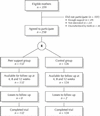The effect of peer support on breast-feeding duration among primiparous women: a randomized controlled trial
- PMID: 11800243
- PMCID: PMC99222
The effect of peer support on breast-feeding duration among primiparous women: a randomized controlled trial
Abstract
Background: Most mothers stop breast-feeding before the recommended 6 months post partum. A systematic review showed that breast-feeding support programs by health care professionals did not substantially improve breast-feeding outcomes beyond 2 months post partum. We conducted a randomized controlled trial to evaluate the effect of peer (mother-to-mother) support on breast-feeding duration among first-time breast-feeding mothers.
Methods: We recruited 256 breast-feeding mothers from 2 semi-urban community hospitals near Toronto and randomly assigned them to a control group (conventional care) or a peer support group (conventional care plus telephone-based support, initiated within 48 hours after hospital discharge, from a woman experienced with breast-feeding who attended a 2.5-hour orientation session). Follow-up of breast-feeding duration, maternal satisfaction with infant feeding method and perceptions of peer support received was conducted at 4, 8 and 12 weeks post partum.
Results: Significantly more mothers in the peer support group than in the control group continued to breast-feed at 3 months post partum (81.1% v. 66.9%, p = 0.01) and did so exclusively (56.8% v. 40.3%, p = 0.01). Breast-feeding rates at 4, 8 and 12 weeks post partum were 92.4%, 84.8% and 81.1% respectively among the mothers in the peer support group, as compared with 83.9%, 75.0% and 66.9% among those in the control group (p < or = 0.05 for all time periods). The corresponding relative risks were 1.10 (95% confidence interval [CI] 1.01-2.72) at 4 weeks, 1.13 (95% CI 1.00-1.28) at 8 weeks and 1.21 (95% CI 1.04-1.41) at 12 weeks post partum. In addition, when asked for an overall rating of their feeding experience, significantly fewer mothers in the peer support group than in the control group were dissatisfied (1.5% v. 10.5%) (p = 0.02). Of the 130 mothers who evaluated the peer support intervention, 81.6% were satisfied with their peer volunteer experience and 100% felt that all new breast-feeding mothers should be offered this peer support intervention.
Interpretation: The telephone-based peer support intervention was effective in maintaining breast-feeding to 3 months post partum and improving satisfaction with the infant feeding experience. The high satisfaction with and acceptance of the intervention indicates that breast-feeding peer support programs, in conjunction with professional health services, are effective.
Figures
Comment in
-
Peer support: making a difference in breast-feeding duration.CMAJ. 2002 Jan 8;166(1):42-3. CMAJ. 2002. PMID: 11800246 Free PMC article. No abstract available.
-
Telephone based peer support increased duration of breast feeding in primiparous mothers.Evid Based Nurs. 2002 Jul;5(3):75. doi: 10.1136/ebn.5.3.75. Evid Based Nurs. 2002. PMID: 12123259 No abstract available.
-
Telephone-based peer support increased the duration of breast-feeding in primiparous mothers.ACP J Club. 2002 Sep-Oct;137(2):68. ACP J Club. 2002. PMID: 12207446 No abstract available.
-
Breast is best for more than 6 months.CMAJ. 2002 Sep 17;167(6):631-2; author reply 632. CMAJ. 2002. PMID: 12358192 Free PMC article. No abstract available.
References
-
- Myres A. A retrospective look at infant feeding practices in Canada: 1965–1971. J Can Diet Assoc 1979;40:200-11.
-
- Toward a healthy future: second report on the health of Canadians. Ottawa: Health Canada; 1999. Cat no H39-468/1999E.
-
- Matthews MK, Webber K, McKim E, Banoub-Baddour S, Laryea M. Infant feeding practices in Newfoundland and Labrador. Can J Public Health 1995; 86:296-300. - PubMed
Publication types
MeSH terms
LinkOut - more resources
Full Text Sources
Medical

